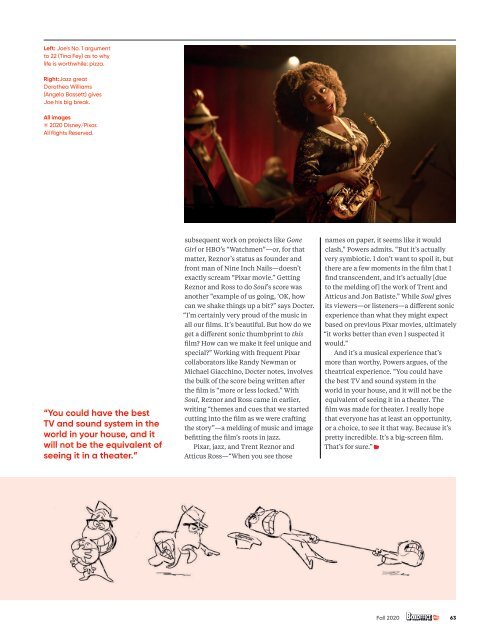Boxoffice Pro Fall 2020
Boxoffice Pro is the official publication of the National Association of Theatre Owners.
Boxoffice Pro is the official publication of the National Association of Theatre Owners.
- No tags were found...
Create successful ePaper yourself
Turn your PDF publications into a flip-book with our unique Google optimized e-Paper software.
Left: Joe’s No. 1 argument<br />
to 22 (Tina Fey) as to why<br />
life is worthwhile: pizza.<br />
Right:Jazz great<br />
Dorothea Williams<br />
(Angela Bassett) gives<br />
Joe his big break.<br />
All images<br />
© <strong>2020</strong> Disney/Pixar.<br />
All Rights Reserved.<br />
“You could have the best<br />
TV and sound system in the<br />
world in your house, and it<br />
will not be the equivalent of<br />
seeing it in a theater.”<br />
subsequent work on projects like Gone<br />
Girl or HBO’s “Watchmen”—or, for that<br />
matter, Reznor’s status as founder and<br />
front man of Nine Inch Nails—doesn’t<br />
exactly scream “Pixar movie.” Getting<br />
Reznor and Ross to do Soul’s score was<br />
another “example of us going, ‘OK, how<br />
can we shake things up a bit?” says Docter.<br />
“I’m certainly very proud of the music in<br />
all our films. It’s beautiful. But how do we<br />
get a different sonic thumbprint to this<br />
film? How can we make it feel unique and<br />
special?” Working with frequent Pixar<br />
collaborators like Randy Newman or<br />
Michael Giacchino, Docter notes, involves<br />
the bulk of the score being written after<br />
the film is “more or less locked.” With<br />
Soul, Reznor and Ross came in earlier,<br />
writing “themes and cues that we started<br />
cutting into the film as we were crafting<br />
the story”—a melding of music and image<br />
befitting the film’s roots in jazz.<br />
Pixar, jazz, and Trent Reznor and<br />
Atticus Ross—“When you see those<br />
names on paper, it seems like it would<br />
clash,” Powers admits. “But it’s actually<br />
very symbiotic. I don’t want to spoil it, but<br />
there are a few moments in the film that I<br />
find transcendent, and it’s actually [due<br />
to the melding of] the work of Trent and<br />
Atticus and Jon Batiste.” While Soul gives<br />
its viewers—or listeners—a different sonic<br />
experience than what they might expect<br />
based on previous Pixar movies, ultimately<br />
“it works better than even I suspected it<br />
would.”<br />
And it’s a musical experience that’s<br />
more than worthy, Powers argues, of the<br />
theatrical experience. “You could have<br />
the best TV and sound system in the<br />
world in your house, and it will not be the<br />
equivalent of seeing it in a theater. The<br />
film was made for theater. I really hope<br />
that everyone has at least an opportunity,<br />
or a choice, to see it that way. Because it’s<br />
pretty incredible. It’s a big-screen film.<br />
That’s for sure.”<br />
<strong>Fall</strong> <strong>2020</strong><br />
63<br />
56-63_Soul.indd 63 30/09/<strong>2020</strong> 09:19

















